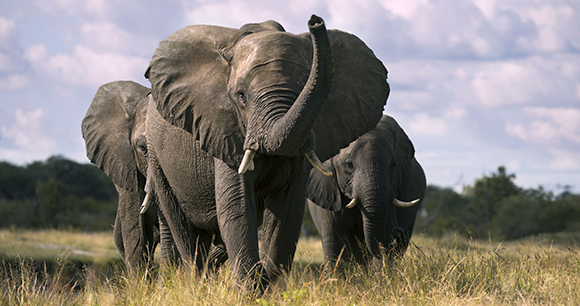
Washington, DC—The Animal Welfare Institute (AWI) commends the US Fish and Wildlife Service (USFWS) for releasing a final rule today that provides additional Endangered Species Act protections for imperiled African elephants. However, AWI is disappointed that the agency failed to prohibit the import of wild-caught elephants for display in zoos, along with sport-hunted elephant trophies.
“African elephants are imperiled due to poaching, habitat loss, and human-elephant conflict,” said Johanna Hamburger, director and senior attorney of AWI’s terrestrial wildlife program. “They should not face additional threats from trophy hunters and facilities that capture and relegate them to a diminished life on display. Such captures serve no conservation purpose: No elephant brought into or born into captivity is ever returned or released into the wild. It is time to end the exploitation elephants for entertainment and profit by prohibiting all elephant imports.”
The capture and removal of wild elephants from close-knit family herds is traumatic for both the captured individuals and the remaining herd. Elephants are highly unsuited to captivity and inevitably suffer in zoos, which cannot meet the complex cognitive and social needs of the species. Even the USFWS concedes in the final rule that “[t]he best available information demonstrates that bringing elephants into captivity impairs their viability — they are not self-sustaining in captivity, and continuous importation is required for breeding purposes.”
Proponents of trophy hunting often tout its economic benefits and contribution to conservation efforts in range states. But studies show that these supposed benefits are vastly overstated, and trophy hunting actively harms the structure and viability of wild elephant populations, which undermines long-term conservation efforts.
Continuing to grant import permits for live elephants and elephant trophies sends the troubling message that the United States is not committed to taking the measures necessary to protect African elephants and provides other nations a justification for following suit.
The final rule does contain many improvements to current US elephant import policies, including (1) requiring exporting range states, such as South Africa, Zimbabwe, and Namibia, to provide information about their elephant conservation efforts; (2) requiring all US facilities receiving live elephants to be “suitably equipped to house and care for them” throughout their lives; and (3) by 2026, allowing non-ivory elephant imports only from countries with domestic laws that conform to international wildlife trade requirements under the Convention on International Trade in Endangered Species of Wild Fauna and Fauna.
However, protecting elephants requires bolder action, and AWI will continue advocating an end to all elephant imports.
Margie Fishman, Animal Welfare Institute
(202) 446-2128, [email protected]
The Animal Welfare Institute is a nonprofit charitable organization founded in 1951 and dedicated to reducing animal suffering caused by people. AWI engages policymakers, scientists, industry, and the public to achieve better treatment of animals everywhere: in agriculture, in commerce, in our communities, in research, and in the wild. Follow us on Facebook, X (formerly Twitter), and Instagram for updates and other important animal protection news.